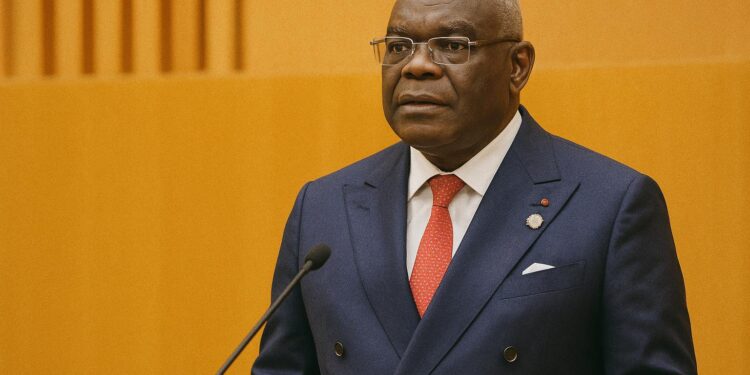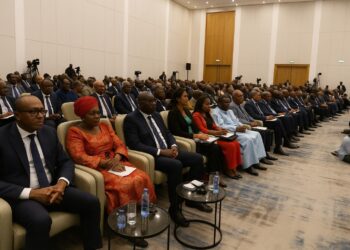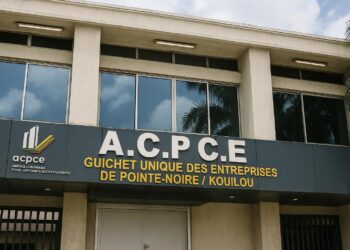Parliamentary spotlight on fiscal rationalisation
The National Assembly’s oral-question session of 4 July 2025 offered an unusually granular window onto the mechanics of Congo-Brazzaville’s fiscal re-engineering. From the rostrum, Prime Minister Anatole Collinet Makosso defended the Guichet Unique de Paiement, a payment gateway enacted under the 2025 Finance Law, as a prudent response to the revenue compression triggered by the Covid-19 downturn. His intervention unfolded before Speaker Isidore Mvouba, who presided over a chamber keen to test the resilience of the still-nascent arrangement.
Why a single window now
Before the reform, ministries and state agencies maintained a constellation of commercial accounts that, according to the Prime Minister, eluded consolidated treasury oversight. The Guichet Unique, placed under the exclusive signature of the Director-General of the Treasury, now funnels all payments into a single circuit, pre-empting leakages and easing cash forecasting. Comparable single-window models deployed in Ghana and Rwanda have demonstrably narrowed fiscal deficits (International Monetary Fund 2024), lending empirical backing to Brazzaville’s choice.
The Banque Postale du Congo as technical pivot
A lingering question among deputies concerned the delegation of payment processing to the state-owned Banque Postale du Congo. Makosso argued that the Treasury’s legacy information systems still lack end-to-end digitisation and cybersecurity safeguards. Pending a full upgrade—timetabled for 2026 in the government’s Public Financial Management Action Plan—the postal bank provides the infrastructure to capture, authenticate and aggregate payments before sweeping balances into the Treasury’s account at the Bank of Central African States. This interim configuration, he stressed, complies with CEMAC prudential norms and does not dilute the constitutional prerogatives of the Treasury.
Compatibility with the Treasury single account
Critics had feared that a parallel payment window could splinter the Treasury Single Account architecture championed by the World Bank as best practice. The Prime Minister countered that the Guichet Unique is not a parallel budget but a secure front-end to the existing single account. In diplomatic parlance, it constitutes a confidence-building measure between line ministries and the central exchequer, ensuring traceability of every franc while larger digital reforms mature.
Debt overhang and the politics of austerity
Makosso acknowledged that the pandemic-era resort to domestic bond issuance has raised the public-debt-to-GDP ratio to roughly 91 percent, a level the IMF classifies as high risk. Yet he portrayed the Guichet Unique as the linchpin of a broader stabilisation agenda aimed at trimming the primary deficit by two percentage points in the 2026 budget cycle. Investors consulted by Fitch Ratings describe the measure as cautiously credit-positive, citing its potential to lengthen the government’s cash-flow visibility and reduce rollover risk.
Infrastructure funding and environmental safeguards
Deputies Pascal Tsaty-Mabiala, Blaise Ombéto and Jérémie Lissouba pressed for clarity on the Road Fund and the ecological footprint of mining ventures in the Niari basin. While reiterating the executive’s commitment to centralising revenue, the Prime Minister pledged to ring-fence allocations for road maintenance and to enforce the 2023 Environmental Code that aligns national practice with the African Development Bank’s safeguard standards. Analysts at the Congo Basin Forest Partnership note that such assurances could unlock additional climate-finance envelopes if revenue tracing remains verifiable.
Diplomatic resonance of fiscal transparency
In regional chancelleries, the reform is interpreted as a signal of Brazzaville’s willingness to modernise without relinquishing strategic autonomy. A senior CEMAC diplomat remarked privately that the Guichet Unique, while technical in appearance, contributes to the bloc’s objective of capital-account harmonisation. Paris and Beijing, both substantial bilateral creditors, are said to welcome any mechanism that boosts payment predictability, a sentiment echoed in a recent communiqué of the Club de Brazzaville business forum.
Strategic patience and the road ahead
By elevating the Treasury to its “exclusive function of revenue recovery and management”, the administration effectively reasserts a classical doctrine of public finance: he who controls the purse controls policy execution. The legislative grilling on 4 July was rigorous yet underscored a converging consensus that the reform, though provisional, is anchored in pragmatic necessity. As the Treasury migrates to a fully digitised platform over the next eighteen months, diplomats will be watching whether the Guichet Unique merely consolidates cash or catalyses a deeper culture of fiscal accountability. For now, Brazzaville’s experiment stands as a measured, technocratic response to a global economic squeeze, one that neither romanticises austerity nor shies away from the discipline required to navigate it.











































